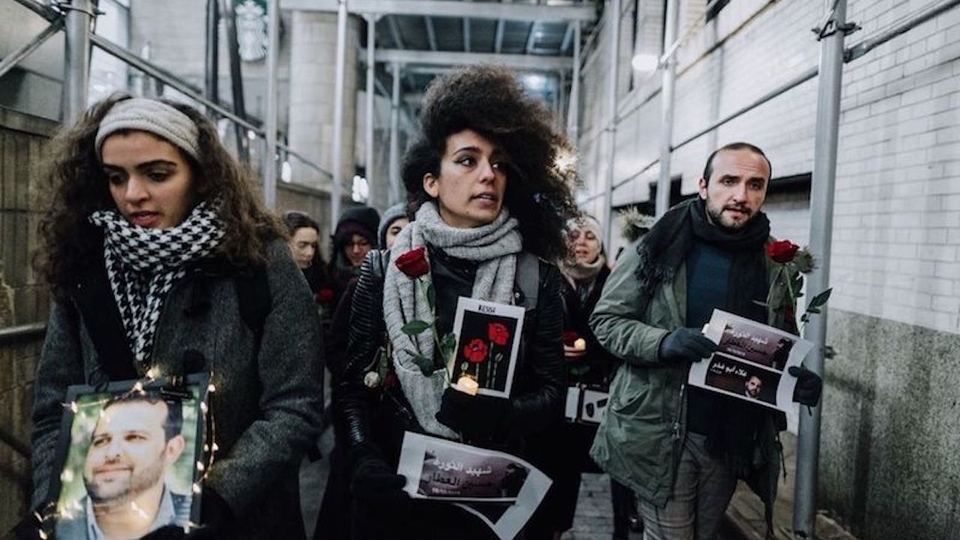On Belonging to a Country That Cannot Keep Its Children
Day 42: Thursday, November 28, 2019
“You've wasted the [people with] talents and given them to the foreigners,” said a prominent banner in downtown Beirut on the very first day of the uprising. It made the Lebanese government responsible for the "brain drain" caused by ongoing migration, and declared migration a problem that could be avoided if it wasn't for the mismanagement of the economy by the political and economic governing elite.
I have noticed with interest the extent to which migration has figured in the discourse of the Lebanese uprising as a lament (“look what you are making us do”), as a problem (“our youth are all leaving”), and as a sign of governmental dysfunction (“we shouldn't have to leave”).
Sometimes, migration has been a factor in the uprising without people being conscious of it as such. Take the way Tripoli, the capital of northern Lebanon, has risen in prominence as one of the epicenters of the protests. Tripoli, for so long perceived by Beirutis as a poor, underdeveloped part of the country, festering with backwardness, poverty, and Islamic fundamentalism — rose in ways no one imagined it to be capable of. Not only did thousands descend to the city’s main square to reject traditional sectarian politics just as much if not more so than they did in Beirut. They did so with style, leaving Beirutis literally speechless: a local rapper got everyone grooving in the square. They were at it in their thousands, and it was incredible to watch.
[I]t was the woman holding the sign “For every drop of tears that has fallen at the airport” that broke me. For the sign points not so much at a social problem but at a primal injury that is at the heart of Lebanon's diasporic culture.
A story that is not told is that these features of Tripoli's “modernity” are impossible to disentangle from it being one of the key centers of migration to Australia and where Australian Lebanese continuously return. Tripoli has a rugby league team (hardly a home-grown sport), and it is impossible to go to Tripoli without hearing people speaking English with an Australian accent. And while the research is yet to be done, I think that Tripoli's uprising is a diasporic penomenon through and through. But so is Beirut’s. I have often sat in street meetings where the conversation had to happen in English because the participants’ Lebanese wasn’t good enough.
And yet, the man in the dark photo below was screaming: “I don’t want to be in a situation where my relatives ring me and say ‘your father's not doing so well’ and I am too far to be able to do anything.” The discourse about migration being something bad that happens to you has always been present in Lebanon, but it often took a back seat to an opposite celebratory discourse: migration as a sign of the Lebanese adventurous and ambitious character, something that runs in Lebanese blood and has been inherited since the times of those trading, adventurous, and ambitious Phoenicians. The uprising has brought the discourse of migration as a social pathology to the forefront. One can hear it everywhere: “We're sick and tired of having to migrate,” “I just got my degree, why should I be looking for a job outside Lebanon?” One young guy held a placard listing the names of his friends who have migrated, with the statement: “Because we want you back.”
But it was the woman holding the sign “For every drop of tears that has fallen at the airport” that broke me. For the sign points not so much at a social problem but at a primal injury that is at the heart of Lebanon's diasporic culture. I have spent so much of my academic life researching this primal injury, which manifests itself most clearly precisely at the airport when one sees parents crying as they say goodbye to their children. I have analyzed both this injury as well as the Lebanese art of acting as if there is no injury at all — a whole culture of dissimulation that is itself a symptom of the depth of the injury.
For a time, I used to wonder at the reason why Lebanese migrants, despite their propensity to narcissistically over-valorise themselves and their achievements, always betrayed a sense of inferiority in the face of the inhabitants of the lands to which they migrated. I used to think that it was an internalization of a developmental racism which made so many of them see westerners as superior. But time and again this was shown not to be true. And it also failed to explain the presence of this sense of inferiority toward people they actually racialize, people who they deem in a racist way civilizationally inferior. Slowly, the source of this sense of inferiority became clear.
The immigrant might do very well socially and economically compared to the locally-born, but nothing will alter the simple fact that unlike the local, the immigrant belongs to a country that could not care for them.
Or, as put to me poetically by a Venezuelan Lebanese informant once: “We are the people whose country could not keep them.”
The bringing of this wound into the open is part of the incredible socio-political but also psychological “revolution against one's own self” that's been unfolding in the streets of Beirut since the 17th of October.
That the President of the Republic allowed himself to tell the demonstrators a variant of the “If you don't like it here, leave” is a sign of how remote and disengaged from popular sensibilities this whole regime has been.
